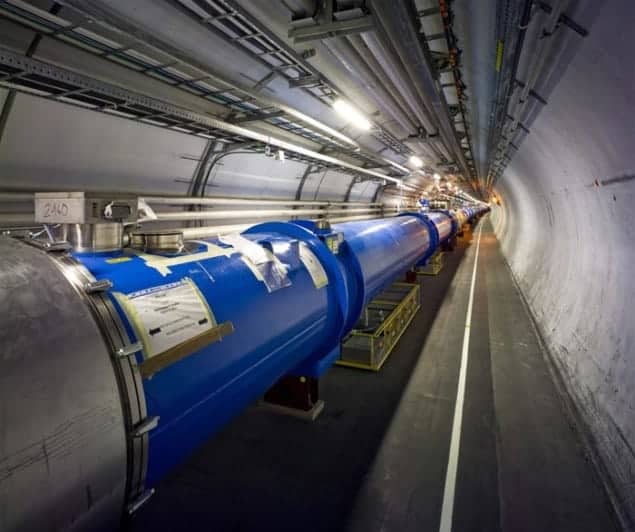
A group of physicists from Switzerland, Japan, Russia, US and the UK has proposed using the tunnel that currently houses the Large Hadron Collider (LHC) at the CERN particle-physics lab near Geneva for a dedicated machine to study the Higgs boson. The facility, dubbed LEP3, is named after CERN’s previous accelerator, the Large Electron–Positron Collider (LEP), which used to exist in the LHC tunnel before being shut down in 2000. In a preliminary study submitted to the European Strategy Preparatory Group, LEP3’s backers say that the machine could be constructed within the next 10 years.
The plans for LEP3 come just weeks after physicists working at CERN reported that they had discovered a new particle that bears a striking resemblance to a Higgs boson, as described by the Standard Model of particle physics. The ATLAS experiment measured its mass at around 125 GeV and the CMS experiment at 126 GeV.
LEP3 would operate at 240 GeV and comprise two separate accelerator rings that would smash electrons and positrons rather than protons and protons, as with the LHC. In their study, the 20 authors call the concept for LEP3 “highly interesting” and that it deserves more detailed study. “Now is the right moment to get this on the table,” says theorist John Ellis from Kings College London in the UK, who is an author of the preliminary study and hopes that it will trigger debate among physicists as to how to study the new boson in detail.
Tunnel vision
LEP3 is designed to be installed in the LHC tunnel and serve the two LHC’s general-purpose detectors – ATLAS and CMS. If LEP3 is to be built, it will have to fight off two rival proposals for a future collider to study the Higgs – the International Linear Collider (ILC) and the Compact Linear Collider (CLIC). But Ellis says that one advantage of LEP3 is that the tunnel to house it is already built and the collider would use the existing infrastructure, such as cryogenics equipment, thus making LEP3 more cost-effective. LEP3 would also use conventional methods to accelerate particles rather than the accelerating superconducting cavities that will be employed by the ILC.
Which collider is built to succeed the LHC will depend on what the LHC discovers in the next couple of years after it has run at its full design energy of 14 TeV. If it turns out that the LHC finds only the Higgs, then Ellis says there would be a strong case for LEP3. But if more particles are discovered by the LHC – such as supersymmetric particles – it would make sense to consider the other two proposals. “LEP3 could be a more secure option than the ILC if only a Higgs is discovered,” Ellis told physicsworld.com. “But, of course, it would be foolish to choose anything now, given that the LHC has not hit full energy yet.”
CERN plans to run the LHC into the 2030s after it has undergone a major upgrade in energy and luminosity in the coming decade. However, Ellis thinks that it may even be possible for the LHC and LEP3 to cohabit for a short time. “It would not be ideal, but it could be something to think about,” says Ellis. “If the LHC does not discover anything beyond the Higgs, then would you keep running it for years?”
“Little scope”
Yet some disagree that LEP3 represents the best way to study the Higgs, adding that a decision would have to be made between building LEP3 and running the high-luminosity upgrade to the LHC in the 2020s. “They both have an excellent physics case, but somehow LEP3 presents less chance of a huge breakthrough,” says one leading CERN researcher who prefers not to be named. “[The LHC upgrade] has precision measurements as well as discovery reach to offer.”
That view is shared by linear-collider director Lyn Evans, who told physicsworld.com that he thinks it is unlikely that the proposal for LEP3 will get very far. “The first job is to fully exploit the LHC and all its upgrades,” says Evans, who led the construction of the LHC. “This is at least a 20 year programme of work, so I think that it is very unlikely that the LHC will be ripped out and replaced by a very modest machine with little scope apart from studying the Higgs.”



